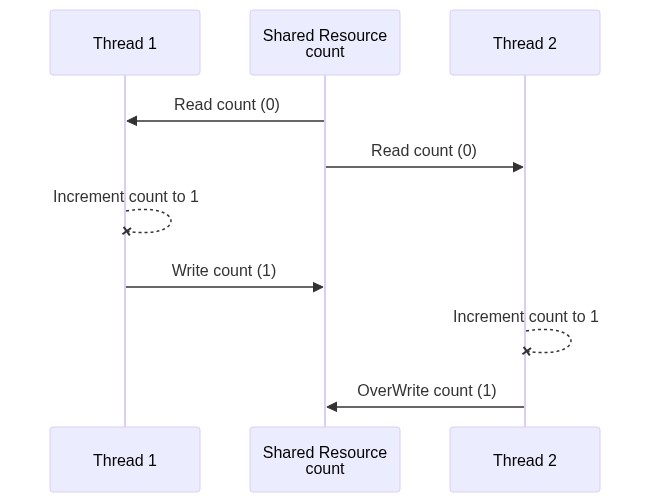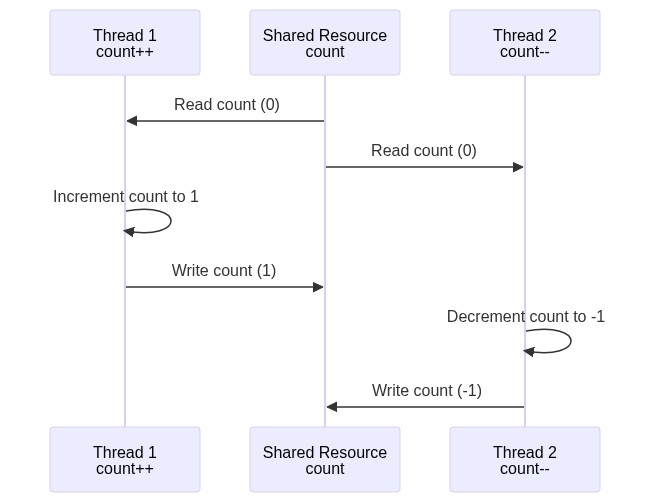Synchronization - Race Condition & Critical Section
What are Shared Resources?
- Variables (Class level, static etc)
- Data structures (Objects)
- File or Connection handles
- Message queues or Work Queues
- Any Other Object
Heap Memory is shared. Stack is created for each thread, so the variables on the Stack aren’t shared.
Concurrent systems -> different threads communicate with each other
Distributed Systems -> different processes communicate.
Reentrant Locks and Semaphores are introduced in Java 1.5
- Reentrant Locks (Mutex) allows only one thread in a critical section.
- Semaphore allows a fixed number of threads to access a critical section.
Atomic Operation
All-or-Nothing: The operation either completes fully or doesn’t start at all.
Indivisibility: No other operations can interleave or interrupt the atomic operation.
In the given example, counter++ or counter-- are not atomic operation as
it involves 3 steps
- Read - Fetch the current value of counter from memory.
- Temp Write - Increment the fetched value by 1.
-
Assignment - Store the incremented value back into counter.
private int counter; public void increment() { counter++; } public void decrement() { counter--; }
If two threads execute counter++ simultaneously, they could both fetch the
same
initial value of counter, increment it, and then store the same new value,
resulting in one increment instead of two.
This is a race condition.
Critical Section
Critical Sections are parts of code that access shared resources and must be protected to prevent concurrent access issues.
- Synchronized Methods and Synchronized Blocks (with lock object) ensure that only one thread can access a critical section at a time.
- ReentrantLocks offer more control and flexibility compared to synchronized blocks.
-
Concurrent Collections are thread-safe and can simplify handling shared
data without manual synchronization.
- Examples: ConcurrentHashMap, CopyOnWriteArrayList, BlockingQueue
Race Condition
- Multiple threads accessing shared resources
- At least one thread is modifying the shared resources
- The timing of thread scheduling may cause incorrect results
- the core of the problem is non-atomic operations performed on the shared resource
Non-Atomic operation - A single Java operation(eg. count++) turns into two or more hardware operation
- fetch current value of count
- perform count+1
- reassign back to count
Interleaved Execution with a shared resource.
Both thread incrementing with NO COMMUNICATION
One thread incrementing, one decrementing
Race Condition Solution
Ensuring Atomicity
Identify and protect the critical section
- Using synchronized keyword
- on the method - monitor
- using synchronized block - more granularity & flexibility but verbose
- Using AtomicInteger
//Run by increment thread
public synchronized void increment() {
count++;
}
//Run by decrement thread
public synchronized void decrement() {
count--;
}
- When thread1 is executing
increment();thread2 can’t executedecrement(); - And when thread2 is executing
decrement();thread1 can’t executeincrement();
That is because both methods are synchronized, and belong to the same object ( counter).
Data Race
Is x strictly greater than y?
private int x = 0, y = 0;
public void increment() {
x++;//Does this always run before y++?
y++;
}
// Check for the above hypothesis
public void checkForDataRace() {
if (y > x)
System.out.println("y > x - Data Race is detected");
}
- One thread running
increment()method in a loop - One checker thread just to see if Data Race occurs.
Code rearrangement
Compiler and CPU may execute the instruction Out of order (if the instructions are independent) to optimize performance
- The logical correctness of the code is always maintained
The compiler re-arranges the instructions for better
- branch prediction (optimized loops,
ifstatements etc.) - Vectorization - parallel instruction execution (SIMD)
- Prefetching instructions - better cache performance
The CPU rearranges the code for better
- hardware units utilization
The following can’t be rearranged as all instructions are interdependent
-
ydepends onxandzdepends onyß
x = 1;
y = x * 2;
z = y + 1;
The following code may be arranged by the Compiler or CPU
- leading to unexpected, paradoxical, and incorrect results.
x++; y++;
//OR
y++; x++;
Data Race - Solution
Establish a Happens-Before semantics by
- synchronization of methods
- solves both race and data condition but has a performance penalty
-
volatile shared variables
- solves race condition for read/write from long and double
- solves all data races by guaranteeing order
Rule of thumb
Every shared variable (modified by at least one thread) should be either
- Guarded by a synchronized block (or any type of lock) OR
- declared volatile
Locks
When we have multiple shared resources, we can use
- one lock for all the shared resources
- Coarse grain locking - simplicity, but performance is not good.
- lots of suspended threads
- individual lock for each resource
- Fine-grained locking - more control, but can cause deadlocks
- more programmatic control but prone to errors.
Deadlocks
Problem when multiple locks are held.
For a deadlock to occur, all 4 conditions need to be met simultaneously.
| Concept | Description |
|---|---|
| Mutual Exclusion | Only one thread can have exclusive access to a resource at a given moment. |
| Hold and Wait | At least one thread is holding a resource and is waiting for another resource. |
| Non-Preemptive Allocation | A resource cannot be released until the thread using it is finished with it. |
|
Circular Wait
|
A situation where one thread is holding resource A and waiting for resource B,
while another thread holds resource B and is waiting for resource A. |
The easiest solution to avoid deadlocks is to break the Circular Wait condition.
Enforcing strict order on lock acquisition prevents deadlocks. Lock resources in the same order everywhere
Deadlock detection
1. Watchdog
In microcontrollers, this watchdog is implemented by a low level routine that periodically checks the status of a particular register.
That register needs to be updated by every thread, every few instructions, and if the watchdog detects that this register hasn’t been updated, it knows that the threads aren’t responsive and will simply restart them in a similar way.
2. Thread Interruption (not possible with synchronized)
3. tryLock Operations (not possible with synchronized)
ReentrantLock
https://nitinkc.github.io/java/multithreading/reentrant-lock/
Semaphore
https://nitinkc.github.io/java/multithreading/semaphores/
Condition Variables
https://nitinkc.github.io/java/multithreading/condition-variables/
Inter-thread Communications
basdkjsadnas
Lock Free Algorithms
What’s wrong with Locks?
- DEADLOCKS
- slow critical section (the one thread that holds the lock for long, the slowest thread determines the speed)
- Priority inversion when 2 threads share a lock, but the low-priority thread
keeps getting scheduled
- Low-priority thread acquires the lock and is preempted (schedule out)
- High-priority thread can’t progress because the low-priority thread is not scheduled to release the lock.
- Thread not releasing the lock (Kill Tolerance)
- Thread dies, gets interrupted, or forgets to release the lock
- Leaves all other threads hanging forever
- Unrecoverable, just like deadlocks
- To avoid, need to write more complex error-prone code.
- Performance overhead in having contention over a lock
- Thread A acquires a lock
- Thread B tries and gets blocked
- Thread B is scheduled out (context switch)
- Later Thread B is scheduled back (another context switch)
- overhead for latency-sensitive applications (stock market data)
Lock free solutions
- uses operations guaranteed to be executed as a single hardware operation
- A single hardware operation
- is Atomic by definition and thus
- threadsafe
Atomic Operations in Java
- Read & Assignment on all primitive types (except for long and double)
- Read & Assigment on all references
- Read & Assignment on all Volatile long and double
Java provides several mechanisms to achieve atomic operations:
-
Atomic Variables : The
java.util.concurrent.atomicpackage provides classes that perform atomic operations on various types: -
Volatile Variables The
volatilekeyword in Java ensures visibility of changes to variables across threads. However, it does not guarantee atomicity for operations on long and double types, which are 64-bit values and may require special handling. -
Synchronization While not strictly atomic operations, synchronized blocks or methods provide mutual exclusion, ensuring that only one thread can execute a block of code at a time. This can be used to manage complex atomic operations that involve multiple steps.
Avoid DataRaces
Make all shared variables that you want to read or write Volatile
- read/Assignment on all Volatile Primitive types and references
Volatile
For primitive types other than long and double atomic operations are typically managed using the volatile keyword or synchronization,
private volatile int counter;
Accessing or updating this counter will be atomic, but only for reads and writes. More complex operations like incrementing require additional synchronization.
Atomic Classes in Java
Atomic classes in java.util.concurrent.atomic package
- internally uses the unsafe class which provides access to low level, native methods
- Java Docs - java.util.concurrent.atomic
AtomicInteger
Atomic Classes for int: The java.util.concurrent.atomic package provides
AtomicInteger for int:
int initialValue = 0;
AtomicInteger atomicInteger = new AtomicInteger(initialValue);
public void increment() {
//Increments by 1,
int previousValue = atomicInteger.getAndIncrement();//return the PREVIUOS value
int updatedValue = atomicInteger.incrementAndGet();// return the NEW-VALUE
//Similarly for decrement
}
public int getValue() {
return atomicCounter.get(); // Atomic read
}
//addAndGet(delta), getAndAdd(delta) increments or decrements by delta(delta can be negative)
Pros
- Simplicity
- no synchronization or locks needed
- no race conditions or data races
Cons
- Only the operation itself is atomic
- There will still be race condition between 2 separate atomic operations
int initialValue = 0; AtomicInteger atomicInteger = new AtomicInteger(initialValue); int a = atomicInteger.incrementAndGet(); int b = atomicInteger.addAndGet(-1); // SUBJECTED TO RACE CONDITION
Summary
AtomicInteger is a great tool for concurrent counting, without the complexity of using a lock
AtomicInteger should be used only when atomic operations are needed.
- it’s on par and sometimes more performant than regular integer with lock protection
Atomic Operations on volatile long and volatile double
In Java, volatile
- guarantees visibility and ordering but
- does not guarantee atomicity for long and double types.
For these types, Java uses AtomicLong and AtomicDouble from the
java.util.concurrent.atomic package
-
note that AtomicDouble is not in the standard library but is available in libraries like Google Guava.
-
AtomicLong: Provides atomic operations for long values: ```java import java.util.concurrent.atomic.AtomicLong;
private final AtomicLong atomicLong = new AtomicLong();
public void incrementLong() { atomicLong.incrementAndGet(); // Atomic increment }
public long getLongValue() { return atomicLong.get(); // Atomic read }
- **AtomicDouble**: Provided by libraries such as Google Guava:
```java
import com.google.common.util.concurrent.AtomicDouble;
private final AtomicDouble atomicDouble = new AtomicDouble();
public void setDouble(double newValue) {
atomicDouble.set(newValue); // Atomic assignment
}
public double getDoubleValue() {
return atomicDouble.get(); // Atomic read
}
AtomicReference
AtomicReference Class: Manages atomic operations on references. For example:
import java.util.concurrent.atomic.AtomicReference;
private final AtomicReference<MyObject> atomicRef = new AtomicReference<>(new MyObject());
public void updateReference(MyObject newValue) {
atomicRef.set(newValue); // Atomic assignment
}
public MyObject getReference() {
return atomicRef.get(); // Atomic read
}
Synchronization Mechanisms in Java
https://nitinkc.github.io/java/multithreading/synchronization-mechanism-java/

